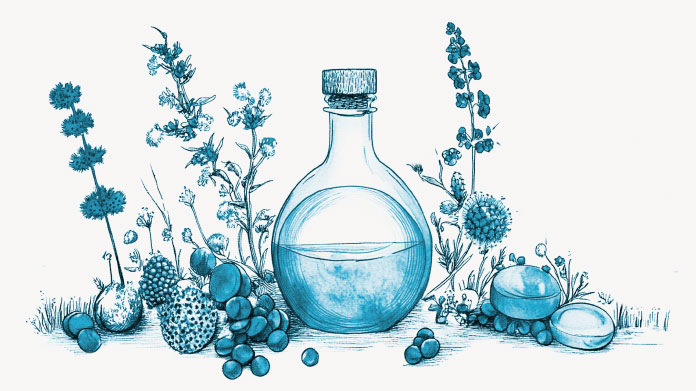Why take a ginger supplement?
A key ingredient in Asian cooking, ginger has also been used in traditional Chinese medicine for thousands of years. What are its benefits? How should you use it? Read on to find the answers to these and other questions.

What exactly is ginger?
Ginger (Zingiber officinale) is a tropical perennial primarily cultivated in its native India, as well as in China.
It is normally the rhizomes that are used. These are the plant’s underground roots which have a distinctive fragrance and spicy flavour.
Ginger is a spice used in many recipes across the globe. It is found in drinks such as ginger ale, in curries, and in cakes, as well as in the famous gingerbread.
A medicinal root prized by many cultures
Ginger has long been used in Chinese medicine, particularly for its direct action on certain meridians.
It is also regarded as a ‘universal medicine’ in Ayurveda (India’s traditional system of medicine).
The Kama Sutra, the 6th century Indian text which describes various sexual practices, contains many references to ginger’s specific properties. In the same vein, the Comtesse du Barry (the mistress of Louis XV) was known to have given ginger to her lovers. We’ll return to ginger’s health benefits a little later.
Composition of Zingiber officinale: what exactly is in ginger?
Ginger contains 60% starch, protein, fats, polysaccharides, essential oils and resin (1).
Its spicy taste, which produces a hot feeling in the mouth, comes from the root’s phenols: gingerol, zingerone, paradol and shogaol.
As the most biologically active of these phenols, gingerol is primarily responsible for ginger’s beneficial effects(2).
Health benefits of ginger
Widely recommended by naturopaths, ginger helps to:
- maintain the immune system(3) ;
- support healthy digestion(4) ;
- maintain a healthy heart (5) and lungs (6) ;
- regulate metabolism (7) ;
- support energy and vitality (8) ;
- and promote well-being when travelling(9).
In addition, ginger contains antioxidants (10), the molecules that reduce the activity of the infamous free radicals which cause premature ageing of our cells.
How should you consume ginger?
Ginger can be consumed in a number of ways:
- fresh. If you like its distinctive taste, grate 1-2cm of ginger root and add to your cooked dishes and salads;
- in a tea (either hot or iced depending on the season). Grate 5g of ginger and allow to infuse for 10 minutes in a cup of water. You can add a little honey to sweeten its spicy taste, and drink 2-4 cups a day;
- in powder form, also for mixing with a drink;
- pickled (this is invariably served as an accompaniment to raw fish dishes in Japan) ;
- preserved, to either enjoy as a sweet or to add to desserts, etc.
Ginger supplements: what are the benefits? Which should you choose?
There are many reasons why ginger supplements are popular:
- some people don’t like the taste of ginger
- or the burning tongue sensation it produces;
- or simply want to significantly increase their intake of gingerol, the main active ingredient in ginger, for medicinal purposes.
Indeed, you can take a ginger supplement to naturally support your digestion, immune system, respiratory tract, cardiac health and vitality.
When buying a ginger supplement, make sure it has a high gingerol content (such as the product Super Gingerols, standardised to 20% gingerols), offering guaranteed efficacy.
Synergistic formulations: the best supplements with a high ginger content
You’ll also find ginger alongside other ingredients in synergistic formulations:
- because of its benefits for respiratory health, ginger is often combined with Terminalia and Piper ;
- it’s also available, with other plant extracts, in certain natural alkaline formulations(such as Alkaline Formula);
- and last but not least, ginger features in Ayurvedic potions (such as Adaptogenic Potion, which contains no less than 10 key plants and mushrooms including ginger, holy basil and reishi.)
References
- Bruneton, J., Pharmacognosie - Phytochimie, plantes médicinales, éd., revue et augmentée, Paris, Tec & Doc - Éditions médicales internationales, , 1288
- Mao QQ, Xu XY, Cao SY, et al. Bioactive Compounds and Bioactivities of Ginger (Zingiber officinale Roscoe). Foods. 2019;8(6):185. Published 2019 May 30. doi:10.3390/foods8060185
- Sultan MT, Butt MS, Qayyum MM, Suleria HA. Immunity: plants as effective mediators. Crit Rev Food Sci Nutr. 2014;54(10):1298-308. doi: 10.1080/10408398.2011.633249. PMID: 24564587.
- Anh NH, Kim SJ, Long NP, et al. Ginger on Human Health: A Comprehensive Systematic Review of 109 Randomized Controlled Trials. Nutrients. 2020;12(1):157. Published 2020 Jan 6. doi:10.3390/nu12010157
- Bode AM, Dong Z. The Amazing and Mighty Ginger. In: Benzie IFF, Wachtel-Galor S, editors. Herbal Medicine: Biomolecular and Clinical Aspects. 2nd edition. Boca Raton (FL): CRC Press/Taylor & Francis; 2011. Chapter 7.
- Mao QQ, Xu XY, Cao SY, et al. Bioactive Compounds and Bioactivities of Ginger (Zingiber officinale Roscoe). Foods. 2019;8(6):185. Published 2019 May 30. doi:10.3390/foods8060185
- Wang J, Li D, Wang P, Hu X, Chen F. Ginger prevents obesity through regulation of energy metabolism and activation of browning in high-fat diet-induced obese mice. J Nutr Biochem. 2019 Aug;70:105-115. doi: 10.1016/j.jnutbio.2019.05.001. Epub 2019 May 21. PMID: 31200315.
- Mashhadi NS, Ghiasvand R, Askari G, Hariri M, Darvishi L, Mofid MR. Anti-oxidative and anti-inflammatory effects of ginger in health and physical activity: review of current evidence. Int J Prev Med. 2013;4(Suppl 1):S36-S42.
- Bode AM, Dong Z. The Amazing and Mighty Ginger. In: Benzie IFF, Wachtel-Galor S, editors. Herbal Medicine: Biomolecular and Clinical Aspects. 2nd edition. Boca Raton (FL): CRC Press/Taylor & Francis; 2011. Chapter 7.
- Mashhadi NS, Ghiasvand R, Askari G, Hariri M, Darvishi L, Mofid MR. Anti-oxidative and anti-inflammatory effects of ginger in health and physical activity: review of current evidence. Int J Prev Med. 2013;4(Suppl 1):S36-S42.
2 Days
The products I use are excel·lent
The products I use are excel·lent
ROSAS Josep Maria
10 Days
Delivery is prompt and I never saw a…
Delivery is prompt and I never saw a quality problem with the manufacturing. It is not possible to assess efficacy on a personal basis, since too many factors come into play. Efficacy can only be assessed statistically with a sufficient number of cases.
Roger De Backer
11 Days
I collaborates with the Supersmart…
I collaborates with the Supersmart more than 10 years. Every thing is going good. Quality of the things is good. Delivery comes in time. Five stars definitely !!!
Oleksiy
11 Days
All good
Simple, frictionless site, easy ordering, good delivery updates and execution.
Chris Robbins
13 Days
I feel better
I feel better
Peter Ammann
13 Days
Prompt delivery
Prompt delivery
JAKUB Radisch
15 Days
My new go-to for top quality supplements!
I am buying more and more of my supplements from this superb, high quality company. Cannot recommend it enough. Plus, excellent customer service with a quick, helpful team and speedy deliveries. Highly recommend Supersmart!
Cecilie H.
18 Days
SUPERSMART WHAT ELSE👍
SUPERSMART WHAT ELSE👍
DIEDERLE Christophe
21 Days
Excellent quality products with…
Excellent quality products with innovative formulas, as someone who has been suffering with acid reflux, these supplements have been lifesavers.
Oriana Moniz
21 Days
high quality supplement!
high quality supplement!
GALANT
22 Days
Good service prompt delivery
Good service prompt delivery
Mrs Marcella Reeves
27 Days
I like your clear explanation
I like your clear explanation. And how to make a choice of products for a specific health problem
Ingrid
33 Days
Great product and it arrives quickly.
Great product and it arrives quickly.
SOMMARIVA Gianni
34 Days
Excellent products and fast service.
Excellent products and fast service. What do we need more?
Margarida
38 Days
The variety of products is amazing
The variety of products is amazing, the offers are good and the sending is very fast. I just miss having a bit more of guidance about combinations, possible interactions, etc.
Maria Angeles Verdu





